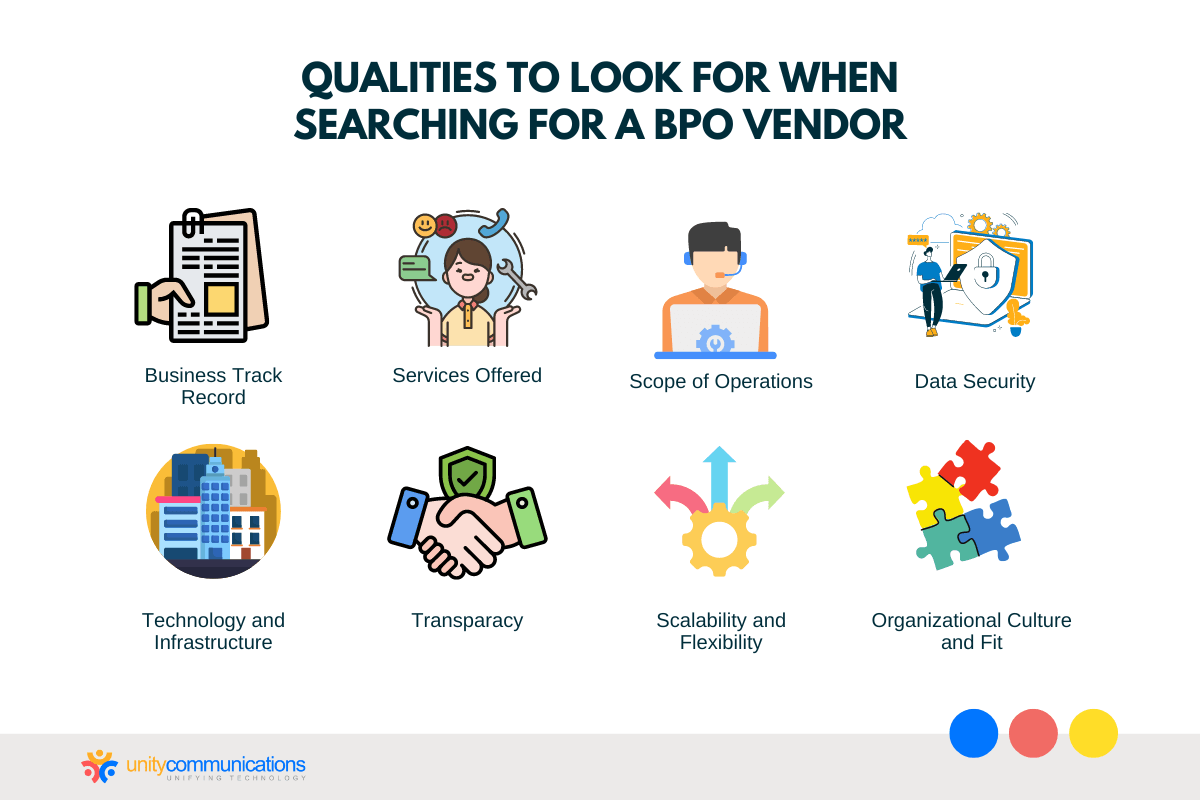Table of Contents
So you have decided to outsource some business functions. The next step is deciding on the best vendor to outsource operations to. However, like many, you may wonder what to look for in a provider.
Business process outsourcing (BPO) helps companies delegate operations without spending on expansion and restructuring. With many BPO companies on the market, businesses must know the best practices and criteria when choosing an outsourcing partner.
This article covers the best practices for selecting a BPO vendor. It also lists key considerations to look for in a service provider.
How to Choose the Right BPO Vendor

To start, what is BPO? This strategy involves outsourcing areas of business operations to a third party. The different types of BPO include:
- Onshore outsourcing is when businesses employ a local BPO company.
- Nearshore outsourcing is subcontracting operations to a vendor in a nearby foreign country with similar time zones.
- Offshore outsourcing involves working with a BPO provider from a faraway country.
Outsourcing non-core business processes is a great way to improve efficiency and focus, but with so many BPO vendors on the market, choosing the right one for your company can be difficult. A good service provider can be a valuable partner.
Here are some tips for finding the BPO vendor that best suits your company’s needs.
- Identify your needs. The first step is determining the tasks and processes you want to offload. Do you need help with human resources (HR) or call center operations? Clarifying your needs narrows your search and helps you find a vendor with the right expertise.
- Research prospective vendors. Once you know what to look for, search for potential vendors. You can read reviews and testimonials from their previous clients. You can also contact references to learn about their experience with the BPO company.
- Ensure the prospect offers services that meet your needs. Expecting a feature like omnichannel customer service when your prospect does not provide multi-channel support will lead to a disappointing BPO experience. Ensure your vendor has experience and expertise in your outsourced function.
- Consider the provider’s location. The provider’s location may be important, depending on the nature of the outsourced function. Work with a local company if you need professionals in the same time zone. However, you have more options if you are open to working with firms in different time zones.
- Assess their reporting capabilities. Understanding what reporting, data, and analytics the provider uses to optimize your processes is crucial. Find out what metrics are ideal for your goals, then ask which metrics the BPO provider tracks. Determine if the prospective vendor will provide customizable reports for you to assess.
- Check out their technology. BPO partners must have access to the latest technology to improve efficiency and streamline processes. BPO teams should also be able to protect your data against malicious actors, especially with the staggering number of cybercrimes. 41.6 million accounts were breached in the first quarter of 2023 alone.
- Ensure flexibility. Check if the firm has the staff, tools, and expertise to grow as your company expands. An outsourcing partner should help you grow and improve the bottom line. You are back to square one if you outgrow them quickly. A good provider must be agile and flexible.
- Check the net promoter score (NPS). NPS tracks the provider’s work quality and the satisfaction of their clients. So how is this connected to the firm’s reliability? NPS reflects how the firm handles tasks and fulfills client needs.
- Communicate and establish clear expectations. Once you have chosen an outsourcing service provider, setting clear expectations and establishing open communication from the outset are crucial. Doing so prevents misunderstandings and ensures you and your partner are on the same page.
Choosing the right BPO vendor is a crucial decision that significantly impacts your operations. You can find the right firm for your company by allocating enough time to identify your needs, research prospective partners, consider flexibility and technology, and establish clear communication.
Key Considerations When Choosing the Right BPO Vendor

More companies are partnering with BPO providers. The latest data shows that 57% of those companies outsource to save on costs. Forward-thinking companies want to lower overhead expenses and keep staff and resources dedicated to the core business. Essentially, organizations want to focus on activities that give them an advantage against rivals.
If you are searching for a BPO vendor, here are some qualities to look for:
- Business track record. This factor involves endorsements from previous and current clients. A BPO company with a proven track record can put you in contact with their clients to discuss their service quality.
- Services offered. Outsourcing leaders will have extensive experience working with various industries, such as healthcare, e-commerce, insurance, information technology (IT), and manufacturing.
- Scope of operations. The BPO industry is highly competitive, so you must choose a firm that offers the services you need at a fraction of the cost of doing them in-house.
- Data security. BPO security is a must. Remember, you will be sharing your data with an external party, so check if the firm has secure practices and proper protections to keep cyber threats at bay.
- Technology and infrastructure. A reliable BPO firm will know how to integrate with and use top-of-the-line technology. This capability allows you to leverage the best tools from planning to deployment.
- Transparency. Can the BPO vendor offer full transparency? Will they be liable for downtime and actions taken on your behalf? Ensure they can provide a no-cost assessment of your operations and outline what they can do for you.
- Scalability and flexibility. Can your prospective provider scale the offered resources to fit your changing needs? Scalability is crucial for increasing or decreasing resources as your business expands.
- Organizational culture and fit. The BPO company’s culture reflects its commitment to providing quality services. Additionally, ensure that you and your potential team match in terms of culture and work environment for smoother collaboration.
The Bottom Line

Since the BPO industry is booming, more inexperienced vendors are populating the market. You must find one with the experience, talent, and resources to do the job properly. A young BPO company may offer competitive pricing, but ensuring it can fulfill your needs and meet your expectations is challenging.
When searching for a vendor, scout the market and look at each firm’s infrastructure, track record, and scope of operations to find the right one for you.
Ready to see what a leader in the BPO industry, such as Unity Communications, can do? Let’s connect to find out.




